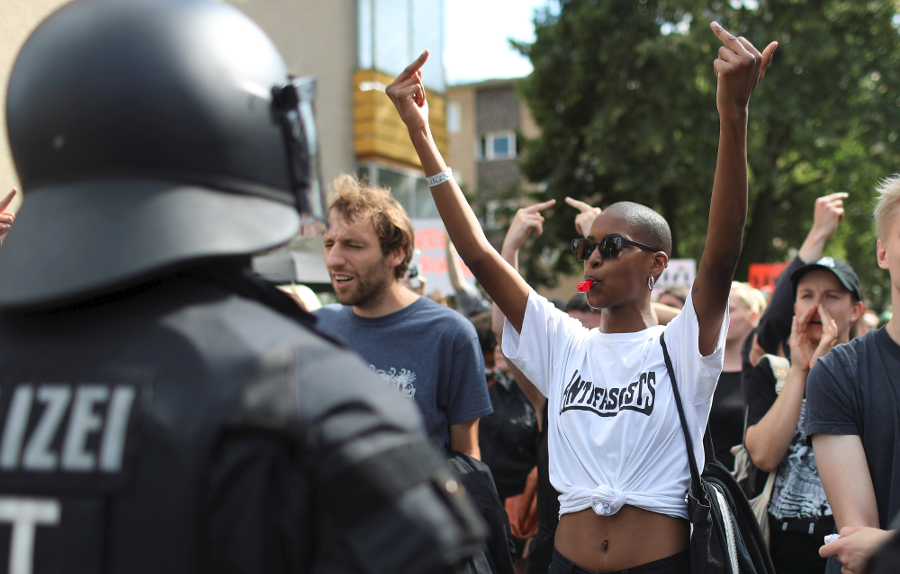A group of residents together with left-wing and activist groups of Berlin took the streets on Saturday in the suburb of Spandau to prevent more than 500 far-right extremists from marching to commemorate the 30th anniversary of the death of high-ranking Nazi convict Rudolf Hess.
The police managed to keep the neo-Nazis and an estimated of 1,000 counter-protesters apart in the Berlin district of Spandau. The neo-Nazi planned to march Saturday to the former Spandau prison, where Hess hanged himself in 1987. They could not reach their goal as they were blocked by the counter-protesters.

“The rats are coming out of the sewers,” said Jossa Bentja, a 64-year-old from the western city of Koblenz who spoke about the clashes in Charlottesville and her parents’ experience living under de Nazi regime. “(President Donald) Trump has made it socially acceptable.”
“I regret nothing.”
Far-right protesters from all Germany and different European countries had their route interrupted by counter demonstrators. About 500 neo Nazi wanted to get to the former Spandau prison where the Nazi official Rudolf Hess, Hitler’s Deputy Fuehrer, was serving his war crimes sentence. He died 30 years ago – at the age of 93 – after he committed suicide; though many neo-Nazi supporters still claim that the Britain intelligence killed him. He was Hitler’s deputy from 1933 to 1941 when he flew solo to Scotland to negotiate peace between the opposite blocs.
However, they were forced to turn back to Spandau’s main station – where the march started – to perform speeches and chants around 5:00 p.m. local time. It was supposed to end at 8 p.m. They could only advance about a kilometer. They had banners that said, “I regret nothing.” They also held white and black flags of Hitler’s Third Reich. In reality, they commemorate Hess’ death every year; however, this March was unusually more polemic because of the far-right march in Charlottesville, Virginia, a few days ago.
Before, the far-right marches took place in the Bavarian town of Wunsiedel, where Hess was buried; but his remains were later removed and cremated by the German authorities precisely to avoid those manifestations.
Banning that march would have gone against the freedom of expression laws
The anti-fascist protesters were integrated by left-wing groups, activists and regular Berlin residents who couldn’t stand to see neo-Nazi walking down the streets of the German capital. In Germany, the crimes of the Nazi regime are still a topic of great sensibility. Symbols of the Nazis such as the swastika flag are banned; as well, the dangers of totalitarianism and the racial politics are incredibly important matters of the German school curriculum.
“It’s appalling that in the year 2017, Nazis can openly go on the streets for this deputy of Hitler,” said Gerhard Sattler, a protester. “This is impossible. The whole of German society must stand up against this.”
Nevertheless, the authorities refused to deny the neo-Nazi protest. According to Berlin’s senator for interior affairs, Andreas Geisel, doing that would be like reducing the political freedoms of democracy.

“I would have been delighted with a ban,” said Andreas Geisel. “But we looked very closely at the matter and concluded that unfortunately arseholes also get to benefit from democratic freedoms.”
However, to guarantee a peaceful environment this Saturday, neo-Nazi protesters were told that they could not glorify Hess or the Nazi regime. As well, they couldn’t carry weapons, drums or torches. Some words were also banned during the protest. Authorities only allowed them to hold one flag per every 25 people. As well, they could not show tattoos with the forbidden swastika. Therefore many of them had to cover arms and legs.
The police tried to balance the protesters’ right to free assembly against rights of counter-demonstrators. About 1000 police officers were displayed over the city to watch out the development of both marches. The Saturday demonstrations carried out peacefully according to Berlin police spokesman, Carsten Mueller
“Nazis go home.”
Since they could not stop the march from starting, about a group of 1,000 people decided to put an end to the neo-Nazi march on their own. They were chanting and crying to the far-right groups “Nazis go home!” and “You lost the war!”
Among the counter protesters, there was Eva Kese, a German mother of two, who said he was there because of Trump. She said – holding her tears back– that she cannot stand an ideology that considers a group to be inferior.
“Donald Trump brought me here today”, said Kese. “There is only one side — the good side. Your hate has no place here”, she added.
Source: U.S News
